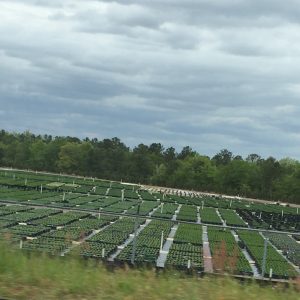
Angelica is a 25 year old Sociology Major at the University of South Carolina Aiken. She’s a self-proclaimed “shopaholic”, a lover of all genres of movies, a resident of the Central Savannah River Area, and a young woman who has persevered in the face of unimaginable hardship.
Escaping abuse and seeking a better life for her and her infant daughter, Angelica’s mother gathered their belongings and together, they fled their hometown of Guadalajara, Mexico. At the mere age of one, Angelica and her mother lived as refugees at an assistance camp in California. It was here that they were finally reunited with Angelica’s father, who had immigrated months prior. Angelica and her parents soon left California to settle down and begin their life anew.
Their next destination? The Central Savannah River Area. Specifically, Johnston, South Carolina. A rural town in Edgefield County whose official welcome sign declares it the “Peach Capital of the World”. Angelica’s family settled in the CSRA because her father had family in the area. The cultural transition was not an easy experience: “The process was difficult. English is my second language, it was hard for me to get adjusted” (2:36) Many members of her family, including her father were unable to enter the formal labor sphere. Angelica’s father relied on the area’s booming agricultural industry to support his family. As a child, Angelica would watch her father, and many family members, work long days in the hot fields with little pay and no benefits. “They work so hard and receive no benefits”. (18:51) They were also frequently subjected to racially charged hate speech by the field supervisors. “It’s hard to see how bad they treat them” (19:27) In the classroom, young Angelica was frequently taunted with racial slurs and ostracized by her classmates, which would continue throughout her years in primary and secondary education. She knew early on that her life was different from the lives’ of other children in the area. “I knew as a child. I used to get picked on for being different” (10:16)



Despite living in the CSRA since she was an infant and considering the area her home, Angelica does not feel welcome or accepted as a member of the community. Acts of discrimination occur too often to count. Comments made by customers during her shifts at the local Home Depot, such as “Go back to your own country” are commonplace. “At my job, customers always ask me ‘Do you have your papers?’ ‘Are you illegal?’ ‘You need to go back to your country'”. (8:00) When asked about the benefits of living in the area, she pondered for a bit before finally admitting that, in her opinion, there are none. “There’s not really much of a benefit, in my opinion.”(7:13) In terms of the greatest barrier faced by living in the CSRA, there was no hesitation in her answer: racism. We experience a lot of racism and discrimination. The racism is so strong here, it’s hard for me to feel like I belong” (13:08) She additionally cites the lack of visibility and organizations as top challenges for the CSRA’s Latino migrant community, and holds frustration towards the pervasive misconception held among local residents that all Latino migrants are Mexican.
For Angelica, she just wants a place to gather and celebrate Latino heritage and culture “(The CSRA) should try and provide places for (our community) to talk.” (14:30) She wants to feel less isolated in the place she calls home. When asked about how different her life and identity would be if she had grown up in California rather than South Carolina, she states that, for starters, she likely would have never learned to speak fluent English. “If I’d stayed in California, I probably wouldn’t speak fluent English because there are more Spanish speaking people in California (9:54) Non-English speakers in South Carolina face tremendous social barriers, and, as such, Angelica’s mother enrolled her in ESL classes at a very young age. “Here, I didn’t really have anybody that spoke my language, so I really had to learn English.” (10:00) Additionally, as there are large and visible Latino communities in California, she’d be able to publicly engage in Mexican traditions and culture, rather than have such traditions confined to the private sphere of her family’s home.
Angelica’s mother frequently instilled the importance of education, ensuring that her daughter attend college and earn a degree. “My mother always wanted me to get an education.” (20:08) She also explains that spending years witnessing the deplorable conditions her father and relatives endured in the crop fields of Johnston and Allendale counties inspired her to pursue a path towards a better future. After attending USC Upstate for a year, Angelica transferred to USC Aiken, changing her major from nursing to sociology along the way. She holds USCA in high esteem, citing that her experience on campus has been a warm and welcome one. The field of sociology further opened her eyes to the social inequalities she’d grown up witnessing and enduring, and has fueled her passion to help others in need. “Before, I used to not really recognize it. Now I recognize it” (21:05) After graduating, Angelica hopes to open her own Non-profit organization that would provide young Latino migrants the necessary resources to pursue an education.
ANGELICA’S FULL TRANSCRIPT CAN BE FOUND HERE